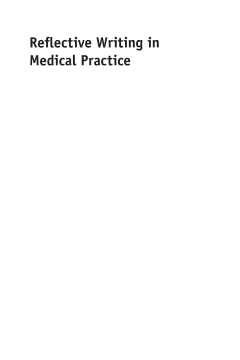
Additional Information
Book Details
Abstract
This book reports the results of a linguistic analysis of reflective written texts, produced during medical education or practice. It explores the topics and communication skills the authors write about, how the narratives develop, how these texts are shaped, what genres influence their composition, how relational work surfaces in them and how the writers linguistically create their identities as experts or novices. It is clear that both experienced and trainee medics grapple with the place of emotions in their communicative acts, and with the idea of what it means to be a doctor. The book makes a valuable contribution to genre analysis, interpersonal pragmatics and the study of linguistic identity construction, and will be essential reading for those involved in teaching doctor–patient communication skills.
Miriam A. Locher is Professor of the Linguistics of English, University of Basel, Switzerland. She is co-editor (with Franziska Gygax) of Narrative Matters in Medical Contexts across Disciplines (2015, John Benjamins) and co-editor (with Andreas H. Jucker) of Pragmatics of Fiction (2017, de Gruyter).
Reflective Writing in Medical Practice is a theoretically engaging and nuanced examination of reflective writing by medical students and practicing physicians. Drawing upon numerous compelling and instructive text excerpts, Miriam A. Locher masterfully integrates insights from separate analyses of genre, interpersonal pragmatics, and linguistic identity construction – resulting in illuminating reading for students and practitioners who work at the intersection of discourse analysis and medical humanities.
The volume provides an impressively rich discourse analysis that employs various methods, both qualitative and quantitative. It offers interesting and useful insight into the ways in which medical professionals and professionals in training understand the importance of patient-centered care vis-à-vis communication skills, how they see themselves as both individuals and health care providers, and how they interpret patient behavior and emotions within the context of medical encounters.
Shelley Staples, University of Arizona, USA
This book is a very welcome and timely contribution to the emerging body of linguistic research in medical humanities. The book is an extraordinary example of the painstaking interdisciplinary research endeavour that forms its background, and a lucid narration by the author on the results of that research. A must read for linguistic scholars in medical humanities, medical educators, medical professionals and anyone else with an interest in how reflective practices can enhance medical communication and practice.
Table of Contents
| Section Title | Page | Action | Price |
|---|---|---|---|
| Contents | v | ||
| Figures and Tables | viii | ||
| Acknowledgements | xi | ||
| 1 Reflective Writing in Medical Practice | 1 | ||
| 2 Context and Data | 10 | ||
| 3 The Choice of Themes: On Communication Strategies and Challenging Situations | 30 | ||
| 4 Communication Skills in Action: From Keeping Eye Contact to Creating Rapport | 51 | ||
| 5 Reflective Writing as Genre: A Text Linguistic Perspective | 72 | ||
| 6 Interpersonal Pragmatics in Reflective Writing | 115 | ||
| 7 Interpersonal Pragmatics and Identity Construction | 148 | ||
| 8 Conclusions | 173 | ||
| 9 Appendices | 178 | ||
| References | 190 | ||
| Subject Index | 201 | ||
| Author Index | 203 | ||
| About the Author | 206 |
